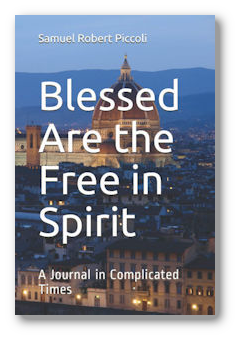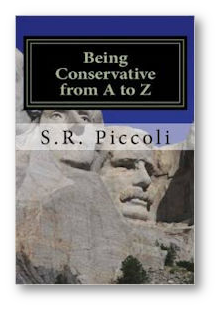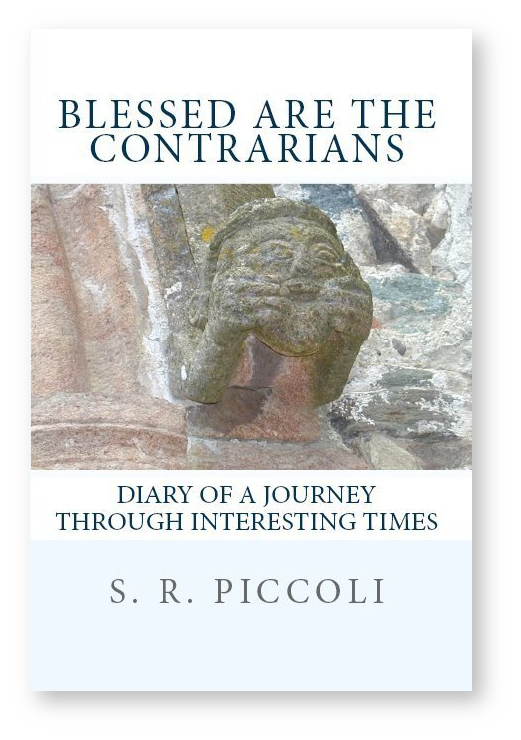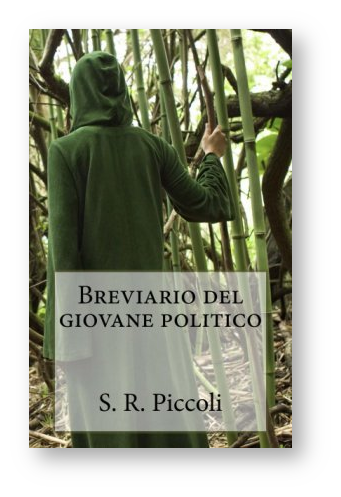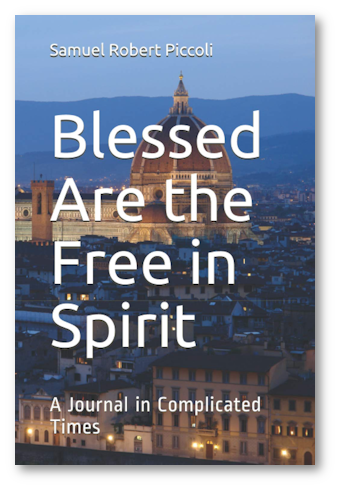





Blessed Are the Contrarians
Breviario del giovane politico
Let's put it this way: to me, it is always like this in people's lives, the idea is to always go forward, to progress toward an ever better condition. And it is right that it should be so. But reality rarely matches the initial vision exactly, and often it marches in the opposite direction. Contrary to popular belief, in our times many never stop unlearning, nor do they give up rising in the hierarchy of what is contrary to the Good, the Beautiful, the Just, or simply the Reasonable. Ours are times of intellectual chaos and moral relativism, if not nihilism, and everything seems on the verge of falling apart, as the events of the recent past in the U.S. and elsewhere, in case it was needed, have abundantly shown—by the way, while I was writing the Introduction, thousands of President Donald Trump's ardent supporters violently were storming the U.S. Capitol building, prompting evacuations, injuries, and arrests...
The whole story of Covid-19 fits perfectly into this context, to the point of becoming, at least in my mind, an effective metaphor of the Zeitgeist, which is interwoven with individual and collective pursuits, aspirations, and ambitions that are so very often ill-conceived, short-sighted, and based on false premises. Yet, such an upside-down world is nevertheless our one and only world—and it is well worth fighting for, in spite of everything. In a small way and to some extent, Blessed Are the Free in Spirit. A Journal in Complicated Times is my contribution to the fight.
Like my previous book, Blessed Are the Contrarians. Diary of a Journey Through Interesting Times, this one is a kind of diary of a journey through our time—politics, culture, lifestyles, worldviews, etc.—and back home again, where “home” stands for a deep sentiment of belonging to our own free and indomitable spirit, which is much stronger than the spirit of our times, however powerful and attractive it may be. Moreover, in this book, as in Blessed Are the Contrarians, I have selected some of the articles posted on my blog over the last few years, those most suitable for this traditional mode of communication. In other words, Blessed Are the Free in Spirit is somehow none other than Part Two of Blessed Are the Contrarians. But with a couple of differences. The first being that in this book, the “journal” entries are arranged in chronological order (from most recent to oldest), as well as by subject matter. The second is that the author is no longer exactly the same person he was when the first book came out in 2012. This for the simple reason that time never passes in vain. As Heraclitus said, “You cannot step into the same river twice.” The water in the river is never the same, it is constantly moving, so the river is never the same river twice…
One word on the title of the book. A free-spirited person can be many different things—even (at least apparently) opposed to one another rather than harmonious or compatible—because their heart is their compass, and heart has no boundaries or rules imposed from outside. When they are religious, they tend to focus on the innermost teachings and truths of their religious faith rather than the “letter” of the Scriptures—and therefore they're often, if not always, on the verge of heresy... They do not dwell on the past but resist a progress built on the destruction of traditions that go back many centuries and of the systematic denial of our history and civilization. They are fiercely independent, but can still develop a close emotional bond with those who provide for them and look to others for protection. They deeply care about their beliefs and what they feel strongly about but seem to not worry at all—except the bare minimum—about normal stuff like money, career, success, etc.
Free-spirited people are the salt of the earth, they are not restful persons. You never relax with these people. They are inspiring and thought-provoking, challenging and uplifting, men and women at their best. They are “contrarians” in the best sense of the word. And so they are somehow a step ahead of those to whom I dedicated my previous book. Some time ago, I stumbled upon an excellent definition of that blessed kind of person: “A free spirit is not bound by this, that, matter, materialism or opinion. They sing, dance, and flow on the wind—for they are at one with it. They are nothing and everything—void and expanse. Even space and time do not confine or define them. For they are pure energy itself” (Rasheed Ogunlaru).
With that being said, please note that free-spirited does not mean self-referential, solipsistic, or selfish. Quite the contrary. It's because they are deeply in love with Life, Humanity, Poetry, Music, Dance, Theater, Writing and so many other things that Free-spirited people are what they are—if they flow on the wind it's because they are at one with it! If they are self-confident it's because they have faith in life! As the French say, tout se tient (everything fits). Freedom itself is not an absolute, not an either-or proposition, but a set of relations, possibilities mixed with actualities. Likewise, freedom of spirit, which is the quintessence of human nature, is basically the fruit of a compromise, a miracle of balance and elegance. Ultimately, free-spirited people cannot but be the result of a coincidentia oppositorum (the coincidence of opposites). As the most elegant of essayists and a living miracle of balance and intellectual like Michel de Montaigne once said, “One may be humble out of pride.” Which is certainly not a good thing, but what if we apply the same scheme in positive rather than in negative terms? Well, let's say, for instance, that one may be cheerful/ironic out of seriousness, easy-going out of severity, naive out of sophistication, and so on. Hence Montaigne's writing en chair et en os (“in the flesh”), as well as the imperceptibly subversive turns of his sentences and the slyly ironic tone that often creeps into his Essays. That's what free-spirited people are made up of, and why they are the salt of the earth.
By invoking blessings on the Free in spirit, I'm trying to express the feeling I feel for them, my deep admiration and gratitude for their very special contribution to mankind and society. They are my North Star, my source of inspiration, and the reason why I am what I am. I would like to think that in whatever I write there is something the free-spirited writers and thinkers of the past centuries would approve of. Likewise, I hope what I write does not displease the free spirits of our day too much.
This is only partially true, however. As a matter of fact, blogging is defined more by a personal and opinionated writing style. The over-40’s know that blogs went largely unchallenged until Facebook reshaped consumer behavior with its all-purpose hub for posting everything social. Twitter also contributed to the upheaval. No longer did Internet users need a blog to connect with the rest of the world. They could instead post quick updates to link to articles that infuriated them, comment on news events, share photos or promote some cause, all the things a blog was intended to do. Yet the change is real, but not essential.
What I loved most about Blessed Are the Free in Spirit is that it is the quintessence of blogging, an example of blogging at its best.
Rob – as the author is best known in the blogosphere and social media – is also a philosopher and a man of letters, and this makes his writing even more fascinating. He can write about almost everything, as his book shows, without boring the reader. In short, he’s a great writer.
At the same time the book shows the importance to have a strong inner compass, and in so doing the author takes the reader’s consciousness to the highest level.
With that being said, if there is a flaw with this book, it is that it is not for everyone: it is not for small-minded people. It is not for people who cannot bear the freedom to be themselves and to take risks rather than just follow convention.
Politically speaking I’d say that this is a book for open-minded Conservatives and common-sense Liberals, or vice versa. Religiously speaking, in turn, this is a book for open-minded Christians and open-hearted secularists. And so on. Not by chance, as the author himself suggests in the Introduction, Blessed Are the Free in Spirit was conceived under the sign of Michel de Montaigne, who excelled in the art of looking at the things of this world without blinkers, prejudices, and preconceived notions. As S.R. Piccoli puts it, “the Lord of Montaigne was a skeptic, but of a very different sort from the one we are familiar with. He was not the kind of skeptic who basically believes in nothing, who refuses to take anything on faith, who takes issue with organized religion, and things like these. Yes, he was a man who doubted almost everything, but at the same time, he was a good Catholic, one who believed without reservation all that the church taught and prescribed. Strange enough, isn’t it? But strange as it might seem, to be honest that’s what I have always liked the most about him.”
To say that I like this book is an understatement, I love Blessed Are the Free in Spirit and strongly recommend it!
Along with his own keen insight, Piccoli borrows from such writers as Edmund Burke, Ronald Reagan, Russel Kirk and others in such a choice manner as to create the desire to delve further into the concepts presented.
Every topic from A to Z is dissected with cool deliberation and unassailable facts(All except Q that is. I think we can all agree Q is the weak point here since so few good words begin with Q. The book should have been called: Being Conservative from A to Z except for Q because Q always sucks. But that’s just my opinion.)
My favorite topics that he explored: The manacles of PC thought, the integral part virtue plays in our government, the slavery of welfare, and, just because it was fun, the different types of conservatives found in America. (I especially liked the explanation of the fabled Crunchy Con, a creature as rare Big Foot sightings these days)
All in all a fast-paced, enjoyable book that should be in every school library.
I highlighted many eye-opening passages in this powerful little book. If I'd had a hard copy and used a pen, I might have ran out of ink. I will definitely return to this book.
Being an author, I spend time on various social networks. I inevitably cross paths with Liberals because they - unfortunately - dominate the landscape of literature in these contemporary times. They often say I am "ideological" and I've never been content with my own answer to that. If I remember anything about this book it will be Piccoli's insightful words, "Conservatism is not an ideology, it's a disposition." That made me realize, better than ever, that Conservatives recognize reality and deal with it whereas Liberals want to impose grand schemes and/or systems to deny reality and march to Utopia.
“This book, which could be described as an anthology of conservative analysis and insights on some key issues, is for readers who wish to acquaint themselves with conservative political thought and to get a critical and comparative perspective on what passes for political, social, economic, and cultural conservatism in their own time and place.”
Piccoli considers conservative thought on topics like family values, guns, education, religion, welfare, justice, and the law. Each topic is addressed briefly by viewing the thoughts of well-known conservatives throughout the centuries. Piccoli quotes often from authorities like Theodore Roosevelt, Barry Goldwater, Edmund Burke (the Father of Modern Conservativism), and Russel Kirk (a well-known American political theorist).
Since gun control is a hot topic in the U.S. right now, I particularly enjoyed studying historical and current thought on the subject. Cesare Beccaria, an 18th-century Italian philosopher, said this in advocacy of gun ownership, “if guns are outlawed, only outlaws will have guns.” These are the kinds of historical snippets you will get throughout the book.
In the book, Piccoli isn’t trying to persuade others to be conservative. He presents historical, conservative thought in a neutral, concise, and academic fashion. If you are interested in learning more about conservative views, look no further than Being Conservative from A to Z.
Although his book is written from the standpoint of a Christian, I don’t think that someone coming from a different worldview would find his beliefs or writing style imposing. He is a philosopher that sometimes takes on the role of historian, and speaks about “meeting” other famous philosophers along the course of his life, while trying to reconcile their writing with different historical events, including current ones. I’m sure if you are also a philosopher, you will love this book. However, as a literary scholar, I also found this collection of characters very interesting. I know that many of my colleagues would agree that this is a worth-while read for anyone that enjoys studying literature. As an example, here is a quote about Ralph Waldo Emerson’s writing, “Therefore, in a sense, I may say that my discovering Emerson was a further exploration of that magnificent country. Yet, apart from the nature, Emerson and America reflect each other in regard to attitudes of mind and views of life.” If you are interested in meeting many complex and influential contrarians, this is the book for you.
In addition to those points, it seems to me (an American expat living in Europe) that Piccoli is well traveled, and tries to understand other people and cultures on a complex level in stead of making assumptions based on his own familiar background. He describes himself as, European by birth, American by philosophy.” This characteristic is a rare thing to find in an author, and I appreciate it very much.
I should also note that any intellectual Christian will find this book immensely refreshing. I think Piccoli accomplishes in his book what Alfred Edersheim meant when he wrote of the parable of the talents, “It refers general to all that a man has, wherewith to serve Christ; for, all that the Christian has — his time, money, opportunities, talents, or learning (and not only ‘the Word’), is Christ’s, and is entrusted to us, not for custody, but to trade withal for the absent Master — to further the progress of His Kingdom.”
“…those who go against the current (as the dictionary states), who take opposing stands from the majority: in the stock markets they buy when others sell and vice-versa; in religious matters, if they are Christians, they continue to believe that Jesus is the Christ, the Son of God, in spite of the Zeitgeist, and if they are not they have the utmost respect for what Christianity is all about and for its contribution to civilization. In matters of culture, education and lifestyles, they are “old-fashioned” while the rest of the world seems to be hell bent on transmuting order into chaos.”
In his essays, Piccoli introduces those who influenced him the most intellectually such as: Montaigne, Emerson, and others. He does this in a novel approach, as though he is introducing friends. He tells how he met them, what he enjoys about them, and how they were contrarians. He said this about Emerson and Montaigne: “To both of them I owe much of what I have achieved in my life as a thinking human being. Montaigne taught me what books really are, their deepest power, their incredible strength. Emerson, on the other hand, taught me what books are NOT, their essential limitations…” Personally, I enjoyed the brief introduction to these writers, as I’ve only heard of them and never truly studied their contributions to philosophy and history.
In other essays, Piccoli shares his own contrarian views—areas where he disagrees with the mainstream. He writes from a conservative Christian worldview but not in a way that others would feel excluded or offended. He considers topics like history, religion, politics, nature, and beauty. The essays are very well-written. Philosophers, intellectuals, and historians at heart will, particularly, enjoy Piccoli’s work.
I find it refreshing to read the outlook of a "thinker" to have faith filled views in such cynical world.
I also want to point out that I very much enjoyed the personal take Piccoli related his thoughts and stories. Including personal stories made the book more likable and not obnoxious.
A philosopher by nature and education, Piccoli writes about political life in both his native country, Italy (the whole Berlusconi fiasco) and in America (the ongoing battles between Obama and the Republicans). Because I’m left leaning in politics, it was refreshing to read his point of view, which is more conservative than mine. I was enlightened in ways I couldn’t have imagined.
Some of his essays are about religion. Since I’ve drifted away from organized religion, I was fascinated by his attention to God, and the Catholic church. Though I didn’t agree with all his positions, he made me think, and he opened my mind up to other possibilities. He gave me a new understanding of the Crusades and how it’s been misinterpreted by Islam and others.
But there is much more. Piccoli also draws on the writings of Shakespeare and the Bible. He discusses the advances made by Galileo, the furor caused by Dante, and the art of Giotto.
Though he’s drawn his ideas from the news and from history, he’s also peppered his writing with anecdotes from his own life. I was especially moved by his story of how, during a family vacation, he had stumbled upon a group of volunteer soldiers who had come out to help earthquake survivors. Unbeknownst to Rob, among them was a man who “had helped to carve the tombstone” of his father’s grave. This is just one of the many stories that will give you pause.
Blessed Are The Contrarians is an intelligent discourse of our times—from the value of solitude to the nature of beauty. This is a book I want to read again
Being American, we don't get any news from Europe, let alone detailed history and analysis of what's happening there; especially Italy. That section of this book helps get a handle, as much as possible anyway, of how
I've been reading "The Windrose Hotel" for a few years (and am honored beyond words that I can contribute). What drew me to it initially was Rob's sense and sensibility, understanding of, explanation and explication of Augustine. Augustine has always been a tough slog for me, but Rob had, and has, a way of explaining Augustine's ideas that settles well. By the end of reading "Contrarians" I was on Amazon looking at Kindle downloads of Augustine's works. It's a good thing to have those writings all combined in this book; provides a clearer understanding.
There's a lot of coverage of art, something that is totally neglected in this country. Rob provides discussions of great artists, and why they're great, from both art history and personal perspectives. Art here in the US, and art writing, is dreadful. It's great to have Rob's observations without the snobbishness prevalent here, just the critical eye and heartfelt appreciation.
The last of the book is about our Faith, Christianity. I was both moved and stimulated, and was making notes to myself of things to pursue, teach and write about.
|


